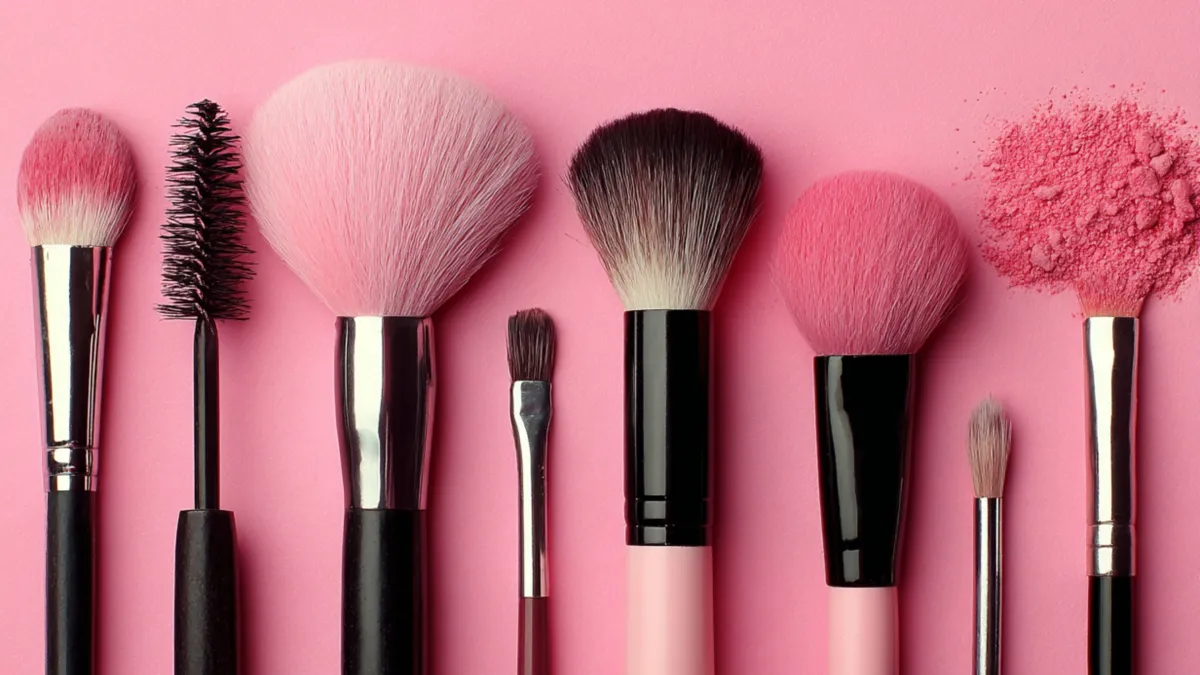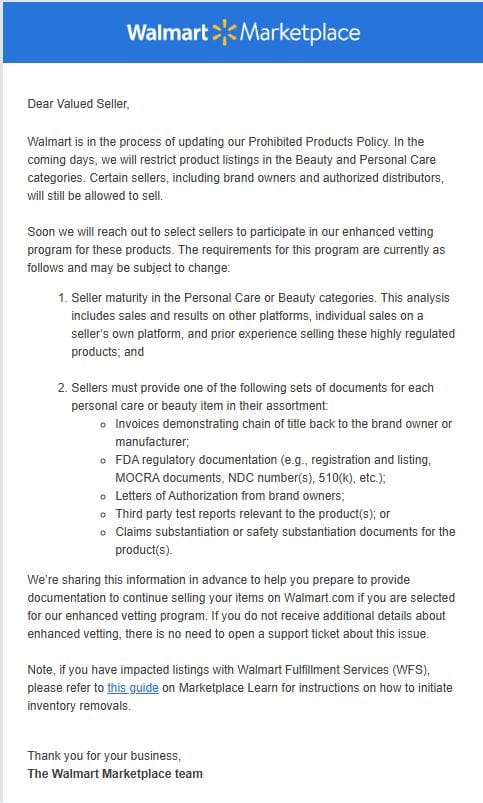
Walmart has announced significant changes to its Prohibited Products Policy affecting beauty and personal care marketplace sellers, with the company announcing plans to restrict product listings in these categories within the coming days. The policy update, announced through seller communications this month, represents a major shift in marketplace governance that will limit selling privileges to brand owners and authorized distributors only.
"Walmart is in the process of updating our Prohibited Products Policy," according to the official notification sent to marketplace sellers. "In the coming days, we will restrict product listings in the Beauty and Personal Care categories. Certain sellers, including brand owners and authorized distributors, will still be allowed to sell."
The announcement has generated significant reaction from affected sellers. Multiple sellers report receiving COMP (compliance) errors overnight, with one seller stating they discovered "about 10 of my listings have errors due to COMP, and these are WFS listings that have stock available." Another affected seller reported 1,766 errors appearing across their beauty product listings in a single morning.
Subscribe the PPC Land newsletter ✉️ for similar stories like this one. Receive the news every day in your inbox. Free of ads. 10 USD per year.
Walmart plans to implement an enhanced vetting program requiring comprehensive documentation from sellers seeking continued marketplace access. The program establishes two primary eligibility criteria that sellers must meet to maintain their beauty and personal care listings.
The first requirement involves demonstrating "seller maturity in the Personal Care or Beauty categories." According to the policy document, "This analysis includes sales and results on other platforms, individual sales on a seller's own platform, and prior experience selling these highly regulated products."
Documentation requirements form the second major component of the vetting process. Sellers must provide specific sets of documents for each personal care or beauty item in their product assortment. The acceptable documentation includes invoices demonstrating chain of title back to the brand owner or manufacturer, FDA regulatory documentation such as registration and listing documents, MOCRA documents, and NDC numbers.
Alternative documentation options include letters of authorization from brand owners, third-party test reports relevant to the products, or claims substantiation documents for the products. These requirements reflect increased regulatory scrutiny in personal care and beauty product categories.

Marketplace reaction and seller impact
The policy changes have triggered widespread discussion among marketplace sellers. According to seller forum discussions, the announcement caught many sellers off guard. "No warning its crazy," stated one affected seller on the WalmartSellers subreddit community.
A seller with four years of Walmart marketplace experience and 15 years of Amazon selling expressed frustration with the sudden implementation. "All of our beauty items are being pulled," the seller wrote. "We have been selling on Walmart for 4 years, Amazon 15. We even correspond regularly with the brand to proved email confirmation of authentic products. The brands has no issues and checks in with us regularly. Walmart still rejected this email correspondence."
For sellers utilizing Walmart Fulfillment Services, the policy changes create additional inventory management challenges. The notification specifically addresses WFS sellers with impacted listings, directing them to "this guide on Marketplace Learn for instructions on how to initiate inventory removals."
Who else did Walmart just destroy?
by u/Dreamcrusher_702 in WalmartSellers
Marketing implications and industry context
The policy modifications come during a period of significant expansion for Walmart's marketplace initiatives. Walmart Marketplace has demonstrated substantial growth momentum, achieving over 30% sales growth in each of the past four quarters according to company data released at the 2024 Marketplace Summit.
Premium Beauty expansion efforts announced at the August 2024 summit included the introduction of more than 20 new brands such as COSRX, T3, and Beachwaver. The marketplace expansion focused on skin care, hair care, and hair tool products presented through custom storefronts and editorial content.
The timing aligns with broader marketplace governance trends affecting e-commerce platforms. Similar compliance enforcement has occurred across major marketplaces, with platforms implementing stricter verification requirements for regulated product categories.
Marketing professionals managing multi-channel beauty brands will need to reassess their Walmart marketplace strategies. The enhanced documentation requirements may favor larger brands with established supply chain documentation over smaller sellers lacking comprehensive regulatory paperwork.
Impact on fulfillment and operations
The policy changes affect sellers across different fulfillment models. Walmart Fulfillment Services users face immediate inventory removal decisions if their products fail to meet new documentation standards. According to the notification, sellers have access to removal instructions through Marketplace Learn resources.
For sellers maintaining their own fulfillment operations, the documentation requirements create new operational overhead. The need to provide chain of title documentation, FDA regulatory paperwork, or brand authorization letters represents a significant compliance burden for smaller sellers.
The implementation timeline remains unclear beyond the reference to "coming days" in the official notification. Walmart stated that selected sellers will receive additional details about the enhanced vetting program, while others will not need to open support tickets about the issue.
Industry precedent and regulatory alignment
The policy modifications reflect broader trends in marketplace regulation of beauty and personal care products. Federal oversight of cosmetics and personal care products has intensified under recent legislation including the Modernization of Cosmetics Regulation Act (MOCRA), which requires enhanced registration and safety documentation.
Similar enforcement actions have occurred on other major e-commerce platforms. Amazon has implemented AI-powered compliance monitoring that scans seller websites for policy violations, extending marketplace governance beyond platform boundaries.
The documentation requirements align with standard industry practices for authorized distribution. Brand owners typically maintain strict control over distribution channels to ensure product authenticity and regulatory compliance.
Cross-platform implications
Marketing professionals managing beauty brands across multiple platforms face new strategic considerations. The Walmart policy changes may accelerate consolidation of marketplace presence among established brands while creating barriers for unauthorized resellers.
Recent policy adjustments allowing cross-platform fulfillment demonstrate Walmart's broader marketplace strategy evolution. The company now permits Amazon Multi-Channel Fulfillment for Walmart orders under specific conditions, indicating increased operational flexibility in some areas while tightening control in others.
The beauty category restrictions contrast with Walmart's expansion efforts in other categories, where the company continues adding new sellers and product assortments. The selective approach suggests strategic focus on categories with heightened regulatory requirements.
Future enforcement expectations
Walmart's approach to the beauty and personal care policy changes may signal broader marketplace governance trends. The company's emphasis on documentation and brand authorization reflects industry-wide movement toward stricter seller verification requirements.
The enhanced vetting program structure could serve as a model for future category restrictions. Similar documentation requirements might extend to other regulated product categories including health supplements, medical devices, or children's products.
For marketing professionals planning marketplace strategies, the changes underscore the importance of maintaining comprehensive compliance documentation across all product categories. Brands with established regulatory frameworks will likely benefit from reduced competition from unauthorized sellers.
Subscribe the PPC Land newsletter ✉️ for similar stories like this one. Receive the news every day in your inbox. Free of ads. 10 USD per year.
Timeline
- July 2025: Walmart announces beauty and personal care policy restrictions through seller communications
- August 27, 2024: Walmart unveils major marketplace expansion including Premium Beauty initiatives
- July 2025: Walmart releases comprehensive seller playbook outlining category expansion strategies
- May 16, 2025: Walmart updates fulfillment policies to allow cross-platform fulfillment services
- April 2024: Walmart integrates marketplace with auto care centers for tire sales and installation services
Subscribe the PPC Land newsletter ✉️ for similar stories like this one. Receive the news every day in your inbox. Free of ads. 10 USD per year.
Summary
Who: Walmart Marketplace implemented policy changes affecting third-party sellers in beauty and personal care categories, with enhanced requirements for brand owners and authorized distributors.
What: Restriction of product listings in beauty and personal care categories requiring comprehensive documentation including FDA regulatory paperwork, brand authorization letters, or chain of title documentation for continued marketplace access.
When: Policy changes announced in July 2025 with implementation planned for "coming days" following the seller notification, affecting existing listings immediately through COMP error generation.
Where: Changes apply to Walmart's U.S. marketplace platform affecting sellers utilizing both self-fulfillment and Walmart Fulfillment Services across beauty and personal care product categories.
Why: Enhanced regulatory compliance requirements for beauty and personal care products, alignment with federal legislation including MOCRA requirements, and marketplace quality control initiatives to ensure authentic product distribution through authorized channels.

